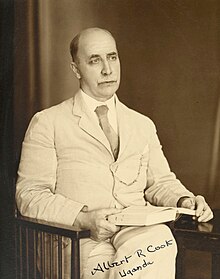Albert Ruskin Cook
Sir Albert Cook | |
|---|---|
 Cook in c.1930 | |
| Born | Albert Ruskin Cook 22 March 1870 Hampstead, London, England |
| Died | 23 April 1951 (aged 81) Kampala, Uganda |
| Education | Trinity College, Cambridge (BA) St Bartholomew's Hospital (MBBS, MD) |
| Occupation(s) | Doctor and missionary |
| Years active | 1896–1951 |
| Known for | Missionary/humanitarian work |
| Spouse | Katharine Cook |
| Medical career | |
| Institutions | Mulago Hospital Mengo Hospital |
| Awards | Order of the British Empire Order of St Michael and St George |
Sir Albert Ruskin Cook, CMG, OBE (22 March 1870 – 23 April 1951)[1] was a British medical missionary in Uganda, and the founder of Mulago Hospital and Mengo Hospital. Together with his wife, Katharine Cook (1863–1938), he established a maternity training school in Uganda.
Medical and missionary career
[edit]
Albert Cook was born in Hampstead, London in 1870. His parents were Dr. W.H. Cook and Harriet Bickersteth Cook. He graduated from Trinity College, Cambridge in 1893 with a bachelor's degree,[2] and from St Bartholomew's Hospital in 1895 as a bachelor of medicine. He became a doctor of medicine in 1901.
In 1896, Albert Cook went to Uganda with a Church Missionary Society mission, and in 1897 he established Mengo Hospital, the oldest hospital in East Africa. In 1899 he was joined by his older brother John Howard Cook, a surgeon and ophthalmologist. Albert Cook married Katharine Timpson, a missionary nurse, in 1900, with whom he had two daughters and a son.
Sir Albert Cook was unusual among medical missionaries because of his efforts to train Africans to become skilled medical workers. He and his wife opened a school for midwives at Mengo and authored a manual of midwifery in Ganda, the local language (Amagezi Agokuzalisa; published by Sheldon Press, London). Albert Cook started training African medical assistants at Mulago during the First World War, and in the 1920s, encouraged the opening of a medical College that initially trained Africans to the level defined by the colonial government as "Asian sub-assistant surgeon". The school grew to become a fully fledged medical school in his lifetime.
Cook established a treatment centre for the venereal diseases and sleeping sickness in 1913, which later became Mulago Hospital. He was president of the Uganda Branch of the British Medical Association (BMA) between 1914 and 1918, during which time he founded a school for African medical assistants.
He was president of The Uganda Society in 1933-1934 preceded by Justice F. G. Smith and succeeded by Edward James Wayland.

Honours
[edit]
Cook was awarded the Order of the British Empire in 1918, the Companion of the Order of St Michael and St George in 1922, and received a knighthood in 1932. In 1936–37, he was again president of BMA (Uganda Branch).
Sir Albert Cook died on 23 April 1951 in Kampala, thirteen years after his wife. He found his final resting place next to her grave at the cemetery of St. Paul's Cathedral Namirembe. His tombstone bears the inscription:
"A TRIBUTE FROM H.H. THE KABAKA; CHIEFS & PEOPLE TO A TRUE FRIEND OF UGANDA"
References
[edit]- ^ Cook, Sir Albert Ruskin (1870–1951) and Cook, Lady (Katharine). mundus.ac.uk
- ^ "Cook, Albert Ruskin (CK889AR)". A Cambridge Alumni Database. University of Cambridge.
Further reading
[edit]- "Cook, Sir Albert Ruskin (1870–1951) and Cook, Lady (Katharine)". Archived from the original on 4 March 2016. Retrieved 17 January 2006.
- "The British Journal of Nursing Supplement, February 1930" (PDF). Retrieved 17 January 2006.
{{cite journal}}: Cite journal requires|journal=(help) - A Doctor and his Dog in Uganda, from the Letters and Journals of A. R. Cook. Edited by Mrs. H. B. Cook. Published by the Religious Tract Society, London. 1903. ASIN B0008A52XW
- Joyce Reason, Safety last: The story of Albert Cook of Uganda. London: Highway Press, 1954. ASIN B0000CJ1DK
- Officers of the Order of the British Empire
- Companions of the Order of St Michael and St George
- Knights Bachelor
- Healthcare in Uganda
- English Anglican missionaries
- Anglican missionaries in Uganda
- Alumni of Trinity College, Cambridge
- Alumni of the Medical College of St Bartholomew's Hospital
- 1870 births
- 1951 deaths
- Christian medical missionaries
- British emigrants to Uganda
- People from Hampstead
- Presidents of The Uganda Society
